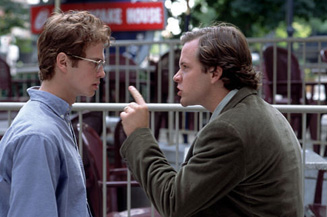Hidden Gems: Shattered Glass
By Kyle Lee
February 20, 2017
BoxOfficeProphets.com

The real Stephen Glass has said that it all started by re-writing a quote from a source. He wished the guy had said a thing in this certain wording, which would’ve been better than what he actually said. So Glass took a chance and re-wrote the quote. When fact checked, the quote was okayed and Glass just kind of went from there into making up more things in his stories until he finally just fabricated them completely. Glass had made his name as the most vigorous of fact checkers when he was an intern, and so developed a reputation that when something from his story didn't quite check out, the fact checker would still okay it because Stephen wouldn't have put it in his story without thoroughly checking it first. Right?
Glass is played in the movie by Hayden Christensen, who is absolutely genius in the role, showing that George Lucas really didn't have any idea how to handle actors in the Star Wars prequel trilogy. Christensen brilliantly portrays Glass as a sort of self-conscious, wounded child that people feel a little bit sorry for, so they cut him some slack when they shouldn't. He has demanding parents he's trying to please by going to Georgetown Law School, writing full-time for The New Republic, and occasionally freelancing for other magazines as his name gets known more and more. His friendly co-workers, played by the reliably wonderful Chloe Sevigny and Melanie Lynskey, listen to his whining about being overworked, but no one really stops to think that Stephen couldn’t actually be putting in the needed amount of work to accomplish everything that he’s doing.
Glass writes a piece about hackers, a story that kills in the writers room when he pitches it, and reads the same way. Forbes Digital Tool, the fledgling online publication from Forbes magazine, picks up the story when their editors read it and are astounded that their own writers weren’t in on this thing. They've never heard of any of the details mentioned in the Glass piece, even though it's right up their alley. So writer Adam Pennenberg (an amazingly subtle Steve Zahn, who should’ve been up for an Oscar for his work here) starts doing some digging. When Pennenberg can't verify anything in the story outside of that there is indeed a state called Nevada, they bring it up to The New Republic's editor Chuck Lane (Peter Sarsgaard, nominated for a Golden Globe for his terrific performance).
Chuck then starts pressuring Stephen to come up with some answers for what he wrote and is offended at what he finds. Sources suddenly don’t want to talk anymore, communicating only by email. Calls go to voicemails with strange sounding voices on the outgoing message. Chuck even starts to entertain the idea that Stephen was duped by these people. That maybe a young writer didn’t do his due diligence on his story and got tricked into thinking it was real. Or maybe it was real and Stephen just took what he was told from his sources and then wrote the story as though he was there because it would sell it better. That’s not the worst thing in the world, is it? But that’s not what happened and Chuck won’t stop digging for the real truth.
It's a wonderfully well done cat-and-mouse game between the two of them, as Chuck pushes while not wanting to believe the truth, with Stephen wriggling any which way he can to try to get out of his made up stories. He tries to lie his way out of his lies, but we see long before he does that he’s going to lose. Chuck isn’t going to cut Stephen the slack everyone else does, especially when fellow journalists are attacking the credibility of the work. As an editor, Chuck’s responsibility is to the magazine and its journalistic integrity. Chuck even starts getting the others to open their eyes when they continually try to come to Stephen’s defense.
Having never been a professional journalist, I can't speak to whether or not Shattered Glass gets the details of the profession right. But it feels right. It feels more real than in most movies about journalists. These actually seem like people's desks, and it feels like they're working in a real office. It has a wonderful, lived-in kind of feeling. Even the awkward moment when Chuck takes over his position from beloved editor Michael Kelly (a surprisingly great dramatic turn from Hank Azaria) feels true to life, even though Billy Ray says on the DVD commentary that it's one of the few moments in the movie that didn't actually happen that way.
At a brisk 94 minutes, you would tend to think that maybe Ray shortchanged his subject, but instead what happened is that he and his actors created their world so vividly that the movie doesn't feel truncated in the slightest. It feels like they told their story, and simply didn’t add any fat to pad the run time. Shattered Glass is one of the most sadly overlooked movies of the 2000s, and having now watched it four or five times, I can say that its impact only strengthens on repeat viewings. I wish there were more like it, but maybe that would make it less special when we find these kinds of movies. Hidden Gems are fun to discover, and Shattered Glass is one that deserves discovery.